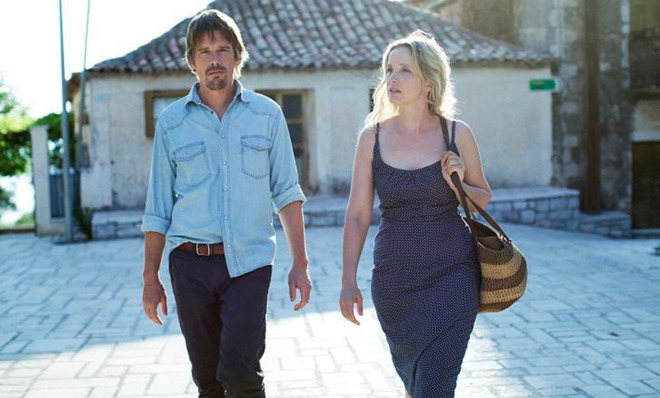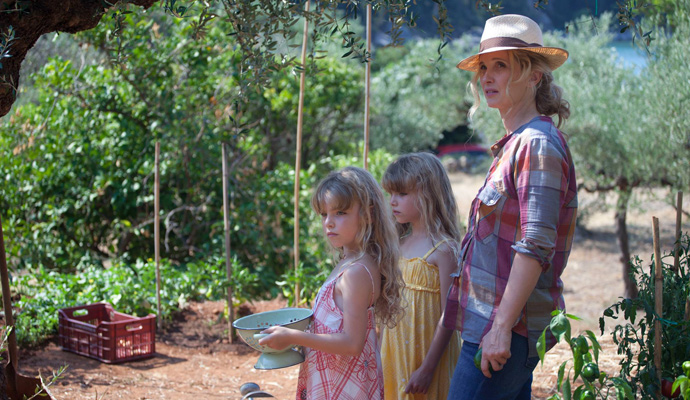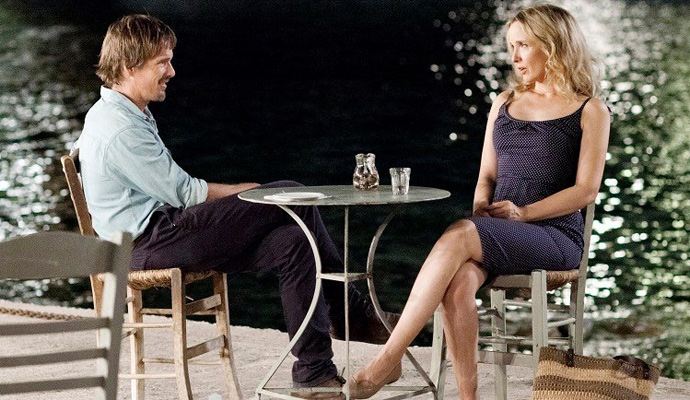Girls on Film: Why Before Midnight is a failure
The Oscar-nominated script for the third entry in Richard Linklater's acclaimed series totally whiffs on what made the first two films so special


A free daily email with the biggest news stories of the day – and the best features from TheWeek.com
You are now subscribed
Your newsletter sign-up was successful
Before Midnight — which will compete for the Best Adapted Screenplay Oscar this Sunday — has been awash in near universal praise, with critics and fans alike delighting in Richard Linklater, Julie Delpy, and Ethan Hawke's exploration of commitment, turmoil, and the struggle to remain happy through the challenges of everyday life.
After meeting on a train and spending a night together in Vienna (Before Sunrise), only to be separated until they met again, many years later, in Paris (Before Sunset), Jesse and Celine are now a couple. They have children, they struggle with the challenges of life, work, and family, and they still banter with the ease that made them fall in love so quickly almost 20 years earlier. But there are cracks in their happiness, which explode when they are finally alone with each other in a hotel, their unhappiness no longer masked by the distractions of children and life. They fight. They almost tear their relationship completely apart — until they stop, sit, and remember the romantic fantasy that brought them together, content with forgetting the anger and remembering the romance.
For many, Before Midnight's conclusion isn't just a morsel of hope, but an actual happy ending. In her review, Stephanie Zacharek wrote, "It's not giving too much away to tell you that Before Midnight has a happy ending — an almost comical one — if only because serious marital disaster is so narrowly averted." Linklater himself aligns more with the side of hope. "You think it's a happy ending?" he asked one journalist. "I'm glad. Hopeful, perhaps."
The Week
Escape your echo chamber. Get the facts behind the news, plus analysis from multiple perspectives.

Sign up for The Week's Free Newsletters
From our morning news briefing to a weekly Good News Newsletter, get the best of The Week delivered directly to your inbox.
From our morning news briefing to a weekly Good News Newsletter, get the best of The Week delivered directly to your inbox.
But such hopefulness misses a very important fact: Jesse and Celine have lost the essential element that made them fall in love in the first film, and drop everything to be together in the second. They have lost the ability to listen to each other and connect. More than a romance between a man and a woman, the films were about the romance of communication. That the writers and audience both forgot this simple fact makes what could have been the most important cinematic love story of all time into the norm it once skewered.
In Before Sunrise, the ultimate act of bonding for Jesse and Celine is their conversation; interaction replaces lustful passion. Instead of coy flirtation and innuendo, they share their thoughts without reservation, from casual intellectual anecdotes to personal stories about family and death. Their connection is unique, to us and themselves. They are intellectually thoughtful and unabashed with each other, but when they play a game and pretend-call their friends back home, their style changes. Their chatter becomes relaxed and more typical. In Before Sunrise, Jesse and Celine don't only find someone who will share and listen. They also find someone who fits into a deeper conversational wavelength missing in their life — the person who needs to hear their thoughts, the person who thrives on them and wants to engage with them.
The initial engagement that fuels the discussion in the first film becomes paramount in Before Sunset. They easily fall into banter, joking about sex, being both open and reserved. Small pronouncements, however, don't have the same impact as deep truths. Jesse might reveal his desire to have sex with her, and Celine might talk of the pain of missing their reunion, but it is only when they are faced with each other's raw honesty that their passion truly reignites.
On that ride to Celine's apartment, the deeper connection is finally rekindled. They have cracked into that unabashed, interpersonal honesty of their youth. It's an important evolution for a pair who spent the movie talking about their idealistic selves and the jaded adults they've grown into. They've discovered that the magic still lives. Of course Jesse will miss his plane. They've found their perfect altitude; they've fulfilled their desire to connect and be understood.
A free daily email with the biggest news stories of the day – and the best features from TheWeek.com
In Before Midnight, however, the pair never recapture that connection. Their conversations have two modes, banter and bitterness, which manifest in both their public and private experiences. They still have new anecdotes to share, but Jesse and Celine fail to ever listen and be truly mindful of the other, even in their darkest pain. They fail to find that moment of connection where they stop hearing only select blips that suit their anger, and start listening to the pain and pressure each is experiencing.

Jesse and Celine are completely disengaged from each other. Interpersonally, this means each of them spend the movie thinking about what each other's pain means for themselves, and not each other. Jesse suffers over his distance from his son, and Celine immediately thinks of how these feelings affect her. When Celine drops the devastating bomb, "I thought about ending it all for myself a hundred times," Jesse lays face-first on the couch silently. He says nothing until he corrects her that Sylvia Plath put her head in an oven, not a toaster. Not even post-partum depression and suicidal thoughts can pull Jesse out of his own problems and press him to engage with Celine.
Of course, there are reasons for these responses. We are watching two people in the middle of years-long turmoil we're not privy to. In the previous films, their pain was always a matter of their experience. Now, it's about specific, shared scenarios they refer to but we never see. Jesse is frustrated with Celine's jumps in logic and appreciation of arguments. She is tired of his condescending, laid-back manner that masks his hurtful comments.
Instead of a progressively modern look at romance, this dynamic has now made the pair utterly antiquated. Where the previous films focused on interpersonal romance, Before Midnight is obsessed with old gender norms. Jesse says something romantic, and Celine calls him a 12-year-old girl. Jesse mourns the fact that his son Henry "leads with his elbow; he throws like a girl." Celine rants about the "garden of sacrifice" women enter, and he mocks her "little narrative of oppression." There are discussions at the table about "everything you need to know about masculine and feminine," and about men obsessed with their penises and how women want to change men. The duo that once connected intellectually now jokes about the sexiness of stupid women.
The narrative is an extension of Jesse and Celine's lives. He's at home with the twins every afternoon, he complains, but is silenced when Celine points out the daily chores he doesn't take part in — the cooking and baths, the scheduling of babysitters and doctors appointments. He is off on frequent trips as she struggles to keep herself together and be supportive of him. She cooks, he muses, and the film upholds this dynamic: Celine and the girls gather the food, and she joins the other women to make dinner as the men talk about sex and literature.
By extension, the gender game falls to us. Celine's the "mayor of Crazy Town," Jesse asserts, and many viewers follow suit. "She's crazy," one critic said to another. She is a "parodic depiction of women." She is "shrill and hysterical. As a result, the valid points that she could be scoring against him fall flat, while his sarcastic comebacks send the audience into stitches at her expense." "Celine has hardened into an angry harridan, while Hawke's Jesse seems barely present." "Celine grows shrill, Jesse more tiresomely tolerant." Since Celine is angry and Jesse mostly calm, she is seen as shrill and he, the voice of reason — even though most of her so-called shrill behavior is the direct result of his smarmy, passive-aggressive bombs.
Before Midnight doesn't fail just because they argue (even if their arguments are gendered). It fails because of how they argue — and ultimately, what the film deems to be a suitable resolution to the argument. After Jesse tells her that she hurts everyone around her with her view of anger as a positive emotion, and she finally explodes, the pair come together at a seaside table.
It is a mess of insincerity and shtick. Jesse professes his unconditional love for Celine, and then quickly adds: "I've put up with plenty of your shit, and if you think I'm some dog who's going to keep putting up with your shit, you're wrong." But he still loves her, so he goes back to his original proposal in Before Sunrise, and asks her to humor him as a favor to her future self, who has sent him to make amends. They are about to have monumental sex and will have a happy life together, he swears. Slowly, word by word, he smoothes the edges of her pain, and she finally relents, stating: "It must be one hell of a night we're about to have."
This time-traveling nod to the beginning, this morsel framed to give us hope, is a fundamental misreading of their own text. By the time Jesse proposed that Celine get off the train with him in Vienna, they'd already connected. His story tapped into that. The dare wasn't to follow on blind faith, it was an opportunity to give their instant rapport a chance.

Now the dare is puerile. He doesn't want to talk to her, he wants her to have sex with him — to ignore her revelation that she's considered killing herself, to ignore the pain he feels about being so far from his son — and that makes all the difference. Our hope for the couple is placed on sex and the avoidance of pain, and not an actual connection, even though their real future relies on their ability to truly listen to each other and try to work things out. Moving from reaction to engagement is work, and it's work neither bother to do over the course of the film in any way.
Deep, endless love, moreover, can exist when relationships fail; it can beat on forever even if life makes romance impossible. Jesse and Celine's obvious love in spite of their pain is not proof that they will stay together. Their avoidance is not a sign of hope. And if it is — if all it takes for Celine and Jesse to right themselves after a torrent of painful admissions is sex — then the Before series has lost the depth that made the first films so powerful: The idea that their connection is about more than the usual sex and superficiality Hollywood romance gives us.
Before Midnight changes the series from a film that turns the tables on real romantic passion and connection to one with the same old cinematic foibles — of women making food, men being lazy and calmly condescending, and sex being all that's needed to keep an unhappy marriage going. Complex, real emotion is now dealt with the same haphazard and uncommunicative indifference.
A truly happy or hopeful ending wasn't far from Before Midnight's grasp. If Jesse and Celine sat down at the end and finally started to listen to each other, to start stoking the embers that had once made their love idyllic and try to work through their issues, Before Midnight wouldn't have lost the courage of its conviction. Like the first two films, it would have been a challenging and relatable exploration of love that actually said something of value. Instead, the series that once made a fantasy romance feel real has moved on to the wrong kind of fantasy.
Girls on Film is a weekly column focusing on women and cinema. It can be found at TheWeek.com every Friday morning. And be sure to follow the Girls on Film Twitter feed for additional femme-con.
Monika Bartyzel is a freelance writer and creator of Girls on Film, a weekly look at femme-centric film news and concerns, now appearing at TheWeek.com. Her work has been published on sites including The Atlantic, Movies.com, Moviefone, Collider, and the now-defunct Cinematical, where she was a lead writer and assignment editor.
-
 The environmental cost of GLP-1s
The environmental cost of GLP-1sThe explainer Producing the drugs is a dirty process
-
 Greenland’s capital becomes ground zero for the country’s diplomatic straits
Greenland’s capital becomes ground zero for the country’s diplomatic straitsIN THE SPOTLIGHT A flurry of new consular activity in Nuuk shows how important Greenland has become to Europeans’ anxiety about American imperialism
-
 ‘This is something that happens all too often’
‘This is something that happens all too often’Instant Opinion Opinion, comment and editorials of the day
